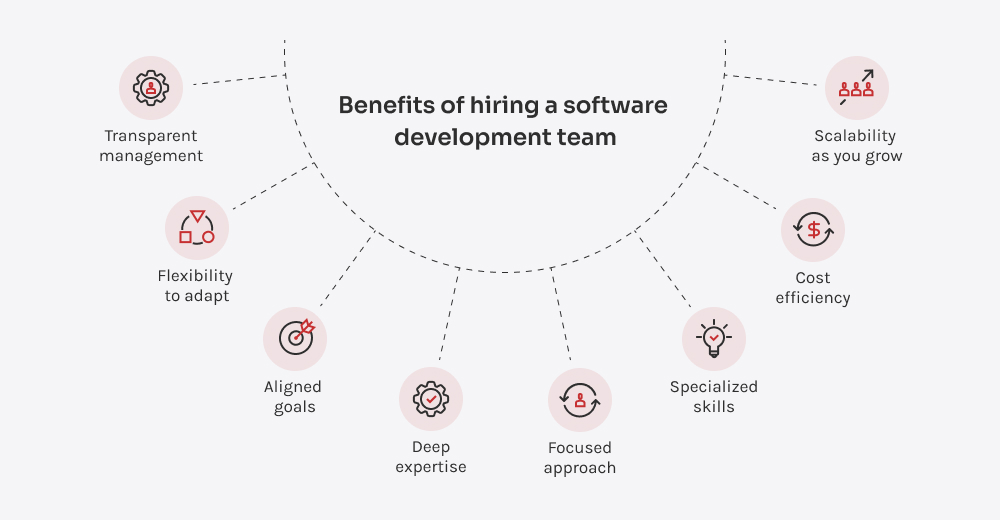Wiadomość została wysłana.
Przetworzymy Twoją prośbę i skontaktujemy się z Tobą tak szybko, jak to możliwe.
Formularz został pomyślnie przesłany.
Więcej informacji można znaleźć w skrzynce pocztowej.



Zajmijmy się słoniem w pokoju: cyfrowa transformacja przemysłu nigdzie się nie wybiera. Wszystko wokół nas ewoluuje, od tego, jak kupujemy ubrania i artykuły spożywcze, po sposób prowadzenia samochodu lub leczenia w szpitalu. Każda firma znajduje się pod presją, aby odświeżać i modernizować oraz w jakiś sposób nadążać za stale zmieniającymi się oczekiwaniami klientów.
Te dramatyczne zmiany doprowadziły do gwałtownego wzrostu rekrutacji najlepszych talentów technologicznych, a obecnie konkurencja jest ostrzejsza niż kiedykolwiek. Rynek outsourcingu IT stale rośnie, z $337,39 miliarda w 2024 roku do $366,51 miliarda w 2025 roku. I nie ma żadnych oznak spowolnienia. Niniejszy raport przewiduje, że wartość rynku wyniesie $560.78 mld do 2030 roku. Wszystko to mówi nam to samo: wszyscy szukają elastycznych, wydajnych zespołów, na które mogą liczyć.
Jednym z podejść, do którego skłania się coraz więcej firm, jest zatrudnianie dedykowanych zespołów programistycznych. Dlatego w tym artykule chcę przeprowadzić Cię przez ten proces:
Pod koniec będziesz wiedział, czy ta ścieżka jest odpowiednia dla twoich celów i następnego dużego projektu.
Dedykowany zespół programistów to osobisty zespół specjalistów technicznych - programistów, testerów, projektantów, specjalistów DevOps, a czasem nawet menedżerów produktu - w pełni zaangażowanych w projekt. Zwykle pracują oni zdalnie, ale na tym polega ich piękno: czują się jak przedłużenie twojego wewnętrznego zespołu, zachowując własną strukturę, procesy i codzienne zarządzanie bez ciągłego nadzoru.
Co sprawia, że różni się to od zwykłych opcji outsourcingu lub zatrudnienia, które widziałem? Koncentracja. Z dedykowany zespół Nie dzielisz się talentem z innymi klientami ani nie martwisz się o ludzi przeskakujących między projektami. Są w tym razem z Tobą, skoncentrowani na Twoim produkcie. Oznacza to lepsze dopasowanie, głębsze zrozumienie Twojej firmy w miarę upływu czasu oraz współpracę, która staje się łatwiejsza i bardziej naturalna, im dłużej razem pracujecie.
Dlaczego zawsze polecam model dedykowanego zespołu? Jak wspomniałem wcześniej, daje on projektowi wysoce skoncentrowaną załogę. Ponadto zyskujesz elastyczność w skalowaniu i prawdziwą własność, która napędza rzeczywiste, wymierne wyniki. Przyjrzyjmy się bliżej tym korzyściom.
Kiedy zatrudniasz dedykowany zespół Pozwala to ominąć fazę prób i błędów, z którą zmaga się tak wiele zespołów. Z reguły zatrudniasz ludzi, którzy mają już doświadczenie w projektach takich jak Twój. Może tworzyli aplikacje fintech, które obsługują tysiące transakcji na sekundę. Lub platformy opieki zdrowotnej, które muszą zrównoważyć bezpieczeństwo z użytecznością. Są szanse, że zmagali się już z tymi samymi wyzwaniami, przed którymi stoisz i wiedzą, jak sobie z nimi poradzić.
Profesjonalny dedykowane zespoły mogą przewidywać przeszkody, zanim jeszcze się pojawią, sugerować inteligentniejsze stosy technologiczne, które można skalować, i tworzyć funkcje w ciągu tygodni, co może zająć niedoświadczonemu zespołowi miesiące. A ponieważ trzymają się twojego projektu, to gromadzić dogłębną wiedzę na temat swojej firmywięc nie zaczynasz od zera za każdym razem, gdy dołącza ktoś nowy. I nie jest to coś, o czym można obsesyjnie marzyć. Widzę to codziennie.
Dedykowane zespoły nie żonglują wieloma klientami. Wszyscy są zaangażowani w Twój produkt. Nie mogę wystarczająco podkreślić, jak dużą różnicę to robi. Kiedy zespół jest całkowicie skoncentrowanyWyłapują każdy najmniejszy szczegół, na przykład gdy poprawka projektu może zmylić użytkowników lub gdy zmiana backendu może wpłynąć na inne systemy. Taka ukierunkowana koncentracja wysiłków prowadzi do lepszy przepływ komunikacji i bardziej zwinny proces decyzyjny, a każda wersja jest bardziej dopracowana, ponieważ zespół zna produkt od podszewki.
Dlaczego przysięgam na ten model? Pozwala zachować zwinność. Wszyscy wiemy, że rozwój produktu rzadko jest linią prostą. Ale z Cały dedykowany zespół programistówbędziesz miał to bardzo potrzebna elastyczność. Musisz wstrzymać nowe funkcje na miesiąc i skupić się tylko na poprawkach błędów i wsparciu? Nie ma problemu. Chcesz utworzyć mały zespół badawczo-rozwojowy, aby przetestować nowy pomysł rynkowy, podczas gdy główny zespół utrzymuje stabilność głównego produktu? Całkowicie wykonalne. Pozwala to na rozwój, obrót i eksperymentowanie.
Widziałem firmy, które szybko zwiększały zatrudnienie, gdy stawka była wysoka, na przykład dodając pięciu dodatkowych programistów i dwóch inżynierów QA w ciągu niecałego miesiąca, aby osiągnąć kamień milowy finansowania. Nie ma mowy, by udało im się to zrobić zatrudniając pracowników wewnętrznych. Widziałem też, jak z taką samą łatwością zmniejszają skalę, redukując się do szczupłego podstawowego zespołu po uruchomieniu, aby obniżyć koszty bez utraty tempa.
Mogę to śmiało powiedzieć: dedykowany model zespołu programistów uchronił wielu moich klientów przed przepaleniem budżetu. W jaki sposób? Ponieważ dzięki dedykowanym zespołom nie tracisz pieniędzy na opłaty rekrutacyjne, niekończące się rozmowy kwalifikacyjne, sesje szkoleniowe, zakup sprzętu lub wynajem dodatkowej powierzchni biurowej. Kto zajmuje się tymi wszystkimi rzeczami? Sprzedawca! Nie ty.
Co więcej, ukryte opłaty, niejasne aktualizacje postępów i to tonące uczucie, gdy zdajesz sobie sprawę, że sprawy są poza torem, ale nikt ci nie powiedział, dopóki nie było za późno. Ten stres nie jest częścią równania z niezawodnym, oddanym zespołem programistów. Otrzymujesz Jasne, przewidywalne ceny - Zwykle jest to prosta miesięczna opłata zależna od wielkości zespołu. Żadnych przykrych niespodzianek, żadnych dodatkowych opłat wyskakujących znikąd.
Kolejną rzeczą, którą najbardziej doceniam w pracy z dedykowanymi zespołami, jest to, że wszystko jest jawne. Jeśli chodzi o ceny, nie płacisz tylko za zarejestrowane godziny - widzisz, jak ta praca przybliża Twój produkt do premiery i jest zgodna z Twoimi celami, i zapewnia prawdziwą wartość. Ale nie chodzi tylko o pieniądze. Klienci mówili mi, że czują się bardziej związani ze swoim zdalnym zespołem niż z pracownikami wewnętrznymi.
Jak to możliwe? Utrzymanie tej więzi jest łatwiejsze dzięki śledzeniu każdego zadania w czasie rzeczywistym, pulpitom nawigacyjnym, cotygodniowym aktualizacjom i przeglądom sprintów. Jesteś stale na bieżąco i dokładnie wiesz, jak wygląda Twój projekt w dowolnym momencie.

Mówiąc jako ktoś, kto widział zarówno zwycięstwa, jak i rosnące bóle: dedykowany zespół programistów może poruszyć igłę - ale tylko wtedy, gdy jest odpowiednio skonfigurowany, właściwie prowadzony i wprowadzony we właściwym momencie podróży produktu. Gdy te elementy są na swoim miejscu, nie tylko zwiększasz możliwości, ale także nadajesz impet.
Dedykowane zespoły mogą wydawać się przesadą w przypadku małych, taktycznych zadań. Jeśli walidujesz MVP lub testujesz wody na nowym rynku, czasami ekipa freelancerów lub mały zespół projektowy pozwala osiągnąć cel szybciej i taniej. Nie chcesz płacić za większą ciągłość i proces, niż faktycznie potrzebujesz.
Pro tip: Bądź brutalnie jasny co do swojej mapy drogowej. Jeśli nie patrzysz poza następny kamień milowy, zachowaj lekkość. Zachowaj dedykowaną konfigurację zespołu na czas, gdy zaczniesz skalować na poważnie.
To jak posiadanie bolidu Formuły 1 na torze bez kierowcy. Twój zespół może budować, projektować i dostarczać. Nie mogą jednak odgadnąć, jakie są priorytety w tym tygodniu. Bez właściciela produktu lub lidera biznesowego sprawy utkną w martwym punkcie. Zadania piętrzą się w oczekiwaniu na odpowiedzi, a zespół zaczyna zastanawiać się nad każdym krokiem.
Pro tip: Wyznacz kogoś, kto jest w pętli codziennie, ma dostęp do interesariuszy i może powiedzieć "tak", "nie" lub "jeszcze nie" bez czekania na spotkanie komitetu.
Jeśli twoje kierownictwo dyszy ci na szyję, abyś osiągnął wyniki już wczoraj, ta faza rozruchu może wydawać się powolna w porównaniu z zatrudnieniem wewnętrznego dewelopera, który już zna zasady. Widziałem płynne konfiguracje w ciągu tygodnia i widziałem bolesne, które ciągnęły się przez miesiąc, ponieważ dostęp bezpieczeństwa trwał wiecznie lub brakowało dokumentacji.
Pro tip: Przygotuj wewnętrzną dokumentację, wyznacz lidera technicznego, który będzie odpowiadał na pytania i potraktuj te pierwsze dwa tygodnie jako inwestycję, która zwróci się w miesiącach płynniejszej dostawy.
Jeśli odejdziesz w cień, zespół dryfuje. Słyszałem, jak dyrektorzy mówili: "Zatrudniliśmy dedykowany zespół programistów, abyśmy mogli wreszcie odejść". Dedykowany zespół ds. rozwoju oprogramowania faktycznie przynosi rezultaty, gdy traktujesz ludzi jak część swojej firmy, a nie tylko zewnętrzną fabrykę, o której nie chcesz wiedzieć. Oznacza to regularne odprawy, rozmowy o strategii i pętle informacji zwrotnych. Im więcej Twój zespół wie o Twoich celach, tym mądrzej podejmuje decyzje.
Pro tip: Wcześnie buduj nawyki - cotygodniowe lub dwutygodniowe rozmowy kierownicze, wspólne wskaźniki KPI i otwarte kanały Slack.
Dedykowany zespół programistów bez menedżera ds. dostarczania, bez spójnego procesu i bez odpowiedzialności to po prostu kosztowny chaos. Powoduje to churn, niedotrzymywanie terminów i produkty, które wydają się zszyte. To bolesne.
Pro tip: Dokładnie zweryfikuj firmę. Zapytaj o stabilność zespołu, zarządzanie dostawami i sposób radzenia sobie z rotacją. Porozmawiaj z poprzednimi klientami.
Czasami po prostu czujesz, że Twój projekt jest większy niż szybki sprint lub praca freelancera. Dedykowany zespół to nie tylko dodatkowe ręce. Jeśli jest dobry, powinien być zaufanym zespołem, który pozostanie z tobą i twoim produktem/projektem na dłuższą metę.
Tworzysz swój podstawowy produkt. Może to być platforma, na której Twoja firma będzie żyć lub umrze, SaaS, który będzie rosnąć wraz z klientami, lub wewnętrzny system, który musi służyć Ci przez lata. W tym przypadku dedykowany zespół jest idealnym rozwiązaniem. Rozumieją domenę, przewidują potrzeby i rozwijają się wraz z produktem. Taki poziom stabilności jest na wagę złota, gdy myślisz długoterminowo.
Być może zaczynasz od jednej funkcji, ale po opiniach klientów priorytety ulegają zmianie. A może rynek się zmienia i nagle trzeba się przestawić. To normalne. Co więcej, jest to znak, że wszystko robisz dobrze. Pracowałem z zespołami, które nie potrafiły się dostosować bez renegocjowania wszystkiego. Zaangażowany zespół idzie z tobą. Znają już twoje cele, więc zmiany zakresu wydają się naturalną korektą kursu, ale nie dużym, bolesnym resetem.
Starszy kod, szalone integracje, rygorystyczne przepisy - takie projekty wymagają czegoś więcej niż tylko podstawowego kodowania. Potrzebują architektów, DevOps, QA, ekspertów ds. bezpieczeństwa... dobrze wyposażonego zespołu. Dedykowany zespół skupia wszystkie potrzebne osoby pod jednym dachem, zgrane i gotowe do wspólnego rozwiązywania trudnych zadań.
Inwestorzy wywierają na Ciebie presję lub konkurencja ściga Cię na rynku. Czas staje się Twoim wrogiem i nie możesz sobie pozwolić na spędzenie 6 miesięcy na budowaniu wewnętrznego zespołu. W Innowise dedykowane zespoły zaczynają działać w ciągu 2 tygodni, szybciej niż można nawet zamieścić ogłoszenie o pracę. I nie tylko kodują; dostarczają ze strukturą, procesem i jakością od pierwszego dnia.
Nawet jeśli projekt jest dobrze dopasowany, wewnętrzna konfiguracja musi wspierać ten model. Dedykowany zespół jest rozszerzeniem Twojej organizacji, a nie wykonawcą, którego można zwolnić i zapomnieć.
Jeśli w Twojej firmie jest ktoś, kto może sterować statkiem, czyli ustalać priorytety, wyjaśniać pytania i łączyć rozwój z celami biznesowymi, jesteś w świetnej formie. Bez tej kotwicy nawet najlepsze zespoły dryfują. Jednak z silną własnością produktu? Sprawy toczą się szybko, a postępy są widoczne.
Zespoły rozwijają się, gdy wiedzą, że mają stabilne finansowanie, ale rozpadają się, gdy projekty są wstrzymywane i wznawiane. Dedykowane zespoły zazwyczaj pracują w oparciu o stabilne miesięczne wynagrodzenie. Jeśli możesz się do tego zobowiązać, unikniesz efektu jo-jo związanego z zatrudnianiem i zwalnianiem pracowników w oparciu o krótkoterminowe wahania budżetu.
Naprawdę pomożesz dedykowanemu zespołowi programistów zabłysnąć, jeśli pozwolisz im nie być tylko "rękami". Pozwól im rzucić wyzwanie twojemu myśleniu, zasugerować lepsze sposoby i dbać o twój sukces tak, jakby to był ich własny. Najlepsze wyniki, jakie widziałem, nie pochodziły od zespołów, które tylko wykonywały rozkazy. Pochodziły one od partnerów, którzy byli właścicielami misji wraz z ludźmi, którzy ich zatrudnili.
Nie musicie być purystami Agile, ale potrzebujecie otwartości. Przez otwartość rozumiem regularne synchronizacje, wspólne narzędzia i chęć wpuszczenia zespołu do swojego świata. Taka przejrzystość i gotowość do ścisłej współpracy znacznie przyczyniają się do tego, że czujemy się jak jeden zespół, a wtedy wszystko naprawdę się układa.
Widziałem założycieli, CTO i zespoły produktowe, które dotarły do punktu, w którym to, co doprowadziło ich tutaj, nie doprowadzi ich tam. Być może MVP zadziałało, ale teraz liczba użytkowników rośnie, a funkcji przybywa. Być może główny zespół jest rozciągnięty, ale istnieje nowy rynek lub linia produktów, które nie mogą czekać. A może wyzwanie technologiczne wymaga umiejętności, których nikt w firmie jeszcze nie dotknął. Jeśli widzisz siebie w więcej niż jednej z tych sytuacji, to jest to dla Ciebie zielone światło. Poniżej przedstawiłem niektóre z najczęstszych scenariuszy, w których projekt wymaga dedykowanego zespołu programistów.
| Scenariusz | Dlaczego dedykowany zespół działa |
| Skalowanie poza MVP | Zapewnia stabilne procesy i dostawy, dzięki czemu można je pewnie skalować. |
| Wejście na nowy rynek lub wprowadzenie nowej linii produktów | Działa jako skoncentrowana grupa zadaniowa, dzięki czemu zespoły wewnętrzne pozostają na bieżąco. |
| Brak specjalistycznych umiejętności | Współpracuje z ekspertami, aby uniknąć błędów i przyspieszyć postępy. |
| Modernizacja starszych systemów | Wykorzystuje sprawdzone playbooki do przebudowy bez przerywania ciągłości. |
| Wewnętrzne rekrutacje nie nadążają | Pomija opóźnienia związane z zatrudnianiem - zespół jest gotowy do pracy w ciągu kilku tygodni. |
| Freelancerzy nie są już opcją | Stays with you through evolution, retained knowledge, and real ownership. |
Najlepsze wyniki osiąga się, gdy traktuje się dedykowany zespół programistów jako prawdziwą część firmy. Nie jakąś zewnętrzną grupę wykonującą zadania po omacku. Zawsze zalecam wprowadzenie ich w codzienny rytm - te same narzędzia, te same spotkania, te same cele. Zaproś ich do planowania produktu, pozwól im usłyszeć opinie klientów, dodaj ich do swoich kanałów Slack itp. Widziałem, jak zespoły otrzymują ogromny wzrost morale, gdy są włączane w wydarzenia firmowe (wirtualne lub rzeczywiste).
Z doświadczenia mogę powiedzieć, że bez kogoś, kto wyznacza priorytety i odblokowuje decyzje, wszystko zwalnia. Opóźnienia w podejmowaniu decyzji zabijają produktywność. Dlatego zawsze najlepiej jest mieć właściciela produktu, który pojawia się na spotkaniach sprintu, szybko odpowiada na pytania i potrafi dostosować cele biznesowe do pracy technicznej.
Sukces oznacza różne rzeczy dla różnych ludzi. Programiści uważają, że skończyli, gdy kod działa; ludzie biznesu dbają o przyjęcie przez użytkowników i przychody. Aby wszystko działało dobrze, należy wcześnie uzgodnić wskaźniki KPI, takie jak czas wprowadzenia produktu na rynek, wzrost konwersji, czas pracy bez przestojów lub wykorzystanie funkcji. Gdy wszyscy płyną w tym samym kierunku, uzyskuje się prawdziwe partnerstwo, a nie tylko wykonywanie zadań. Wtedy zwrot z inwestycji zaczyna być wyraźnie widoczny.
Częste, uczciwe aktualizacje zapobiegają nieporozumieniom i wychwytują problemy, zanim staną się kulą śniegową. Ustal regularne kadencje: codzienne stand-upy (nawet praca asynchroniczna), cotygodniowe przeglądy sprintu i comiesięczne kontrole strategii. Korzystaj z narzędzi takich jak Slack, Jira i Confluence, aby wszystko było przejrzyste. To buduje zaufanie, a to jest złoto.
Jedną z rzeczy, którą zawsze gorąco polecam, jest poleganie na kierowniku ds. dostaw dostawcy. Ich głównym obowiązkiem jest zarządzanie codziennymi działaniami i utrzymywanie wysokiego poziomu motywacji i zaangażowania w zespole. W szczególności, gdy próbujesz mikrozarządzać, hamujesz postęp. Należy raczej określić, co jest potrzebne i wyznaczyć cele we współpracy z kierownikiem ds. dostaw.
Nawet najlepsi programiści nie mogą rozpocząć pracy, jeśli nie rozumieją Twojej firmy. Widziałem projekty, które potknęły się tylko dlatego, że onboarding był pospieszny. Aby uniknąć takiego załamania, udostępnij swoją dokumentację, mapy drogowe, personę użytkownika i diagramy architektury. Organizuj sesje pytań i odpowiedzi na wczesnym etapie. Im szybciej dotrą do twojego świata, tym szybciej osiągną rzeczywiste wyniki. Ogranicza to również późniejsze pomyłki.
Oto coś, co odróżnia dobre zespoły od świetnych: otwarta informacja zwrotna - nie tylko od ciebie do nich, ale także od nich do ciebie. Organizuj retrosy, podczas których obie strony omawiają, co działa, a co nie. Zachęcaj sprzedawcę do szczerości i uważnego słuchania. Często drobne poprawki po twojej stronie (takie jak szybsze zatwierdzanie lub bardziej precyzyjne specyfikacje) mogą znacznie zwiększyć wydajność zespołu.
Stabilność utrzymuje wysoką prędkość. Ciągłe przełączanie kontekstu jest cichym zabójcą produktywności. Staraj się więc, aby role były jasne. Programiści nie powinni być zmuszani do pełnienia ról BA lub QA, chyba że zostanie to określone w ten sposób. I staraj się unikać zmian w połowie sprintu, chyba że jest to absolutnie konieczne. Niech pozostaną w przepływie.
Gdy Twój zespół jest już stabilny, nie ograniczaj się tylko do kodowania. Zatrudniłeś inteligentnych ludzi. Prawda? Więc pozwól im pomóc Ci przygotować produkt na przyszłość. Poproś ich o wkład w architekturę produktu, automatyzację, a nawet nowe funkcje. Widziałem ogromną wartość odblokowaną, gdy zespoły mają możliwość sugerowania ulepszeń i innowacji.
Na koniec chciałbym powiedzieć: nie wpadaj w pułapkę mierzenia zarejestrowanych godzin lub zamkniętych ticketów. Liczą się metryki, takie jak częstotliwość wdrożeń, czas cyklu, czas sprawności i zaangażowanie użytkowników, a nie tylko punkty fabularne lub przepracowane godziny. Dzięki temu wszyscy skupiają się na tym, co naprawdę się liczy: dostarczaniu wyników biznesowych, a nie tylko byciu zajętym dla samego bycia zajętym.
Dedykowany programista Kto jest zgodny z Twoją wizją, dostosowuje się do Twoich procesów i bierze odpowiedzialność za wyniki? Innowise to miejsce, w którym możesz znaleźć takich zaangażowanych profesjonalistów i zbudować zespół, który popchnie Twój projekt do przodu i wesprze Twój sukces biznesowy. I to nie jest tylko gadanie - mamy historie sukcesu aby to poprzeć.
Nie rzucamy po prostu inżynierów do projektu i liczymy na najlepsze wyniki. Jesteśmy Tworzenie dedykowanych zespołów które faktycznie znają Twój świat i mówią Twoim językiem. Chodzi mi o to, że bez względu na to, do jakiej branży należysz - fintech, opieki zdrowotnej, logistyki, lub sprzedaż detaliczna - Istnieje duże prawdopodobieństwo, że zmagaliśmy się z wyzwaniami podobnymi do twoich i znaleźliśmy sprytne sposoby na ich pokonanie.
To dla mnie sprawa osobista: Pracowałem nad projektami, w których panował chaos, ponieważ nikt nie był właścicielem dostawy. Tutaj każdy zespół jest prowadzony przez menedżera ds. dostarczania, którego jedynym celem jest utrzymanie zgodności, przewidywalności i wydajności. Planowanie sprintów, kontrola jakości, zarządzanie wydaniami - masz to wszystko pod kontrolą. Koniec z gaszeniem pożarów z powodu niedotrzymanych terminów lub niechlujnego przekazywania zadań. Ty koncentrujesz się na strategii, podczas gdy my dbamy o to, by koła obracały się płynnie.
Potrzebujesz trzech deweloperów na start, ale chcesz zwiększyć ich liczbę do dziesięciu w ciągu dwóch miesięcy? Możemy to zrobić. I robiliśmy to już wiele razy. Dzięki naszym wstępnie zweryfikowanym pulom talentów i wewnętrznym planom tworzenia kopii zapasowych, możemy działać szybko bez poświęcania jakości lub zgrania zespołu.
W zależności od tego, co tworzysz, możemy obejmować analityków biznesowych, architektów rozwiązań, projektantów UI/UX, inżynierów QA i specjalistów DevOps. Zajmujemy się też zatrudnianiem, wdrażaniem i integracją zespołu, więc Ty nie musisz tego robić. Otrzymujesz samowystarczalną jednostkę dostarczającą, która może być właścicielem wyników, a nie tylko grupą ludzi czekających, aż powiesz im, co mają robić dalej.
Możesz się zrelaksować, wiedząc, że zarządzanie, ochrona własności intelektualnej i zgodność są obsługiwane. Działamy zgodnie ze standardami korporacyjnymi od pierwszego dnia. Nasze zespoły stosują bezpieczne praktyki programistyczne, podpisują umowy o zachowaniu poufności i już współpracują z klientami z branż podlegających ścisłym regulacjom. Wszystko to pozwala mi zagwarantować, że nigdy nie będziesz narażony.
Nie jesteśmy też fanami niespodzianek budżetowych. Współpracując z nami, otrzymujesz prostą, przewidywalną opłatę opartą na wybranych modelach cenowych. Ponadto na bieżąco informujemy Cię o postępach, dostarczamy raporty i zapewniamy otwarty dostęp do wszystkich narzędzi i dokumentacji. Możesz planować swoje budżety, śledzić ROI i zachować kontrolę.
Oto, co napawa mnie dumą: nasze zespoły nie czekają tylko na instrukcje. Proaktywnie sugerujemy inteligentniejsze rozwiązania, w razie potrzeby kwestionujemy założenia i pomagamy udoskonalić mapę drogową produktu. Widziałem klientów, którzy całkowicie przestawili się na lepsze architektury tylko dlatego, że nasz zespół odezwał się wcześnie.
Wielu naszych klientów (93%, jeśli mamy być bardzo konkretni) pozostało z nami przez lata, rozwijając swoje zespoły, ewoluując swoje produkty i pogłębiając relacje. Stawiamy na ciągłość zespołu i utrzymanie wiedzy, ponieważ w ten sposób z czasem osiągamy prawdziwy sukces. W rezultacie otrzymujesz stabilny zespół, który zna Twoją firmę od podszewki - i pozostaje tak samo zaangażowany w Twój sukces, jak Ty.
Z dużymi celami wiążą się duże wymagania - i to właśnie tutaj dedykowane usługi zespołowe błyszczą. Zapewniają one elastyczność umożliwiającą rozwój, umiejętności pozwalające rozwiązywać trudne problemy oraz koncentrację umożliwiającą dotrzymywanie terminów bez żadnych kompromisów. Jeśli szukasz partnera do zbudowania zespołu, który jest tak samo zaangażowany w Twój sukces, jak Ty, Innowise jest gotowy do działania.

Dyrektor ds. technologii
Dmitry kieruje strategią technologiczną stojącą za dedykowanymi rozwiązaniami, które faktycznie działają na korzyść klientów – teraz i w miarę ich rozwoju. Łączy szeroką wizję z praktyczną realizacją, upewniając się, że każda kompilacja jest inteligentna, skalowalna i dostosowana do firmy.












Wiadomość została wysłana.
Przetworzymy Twoją prośbę i skontaktujemy się z Tobą tak szybko, jak to możliwe.

Rejestrując się, wyrażasz zgodę na naszą Polityką Prywatności, w tym korzystanie z plików cookie i przekazywanie Twoich danych osobowych.